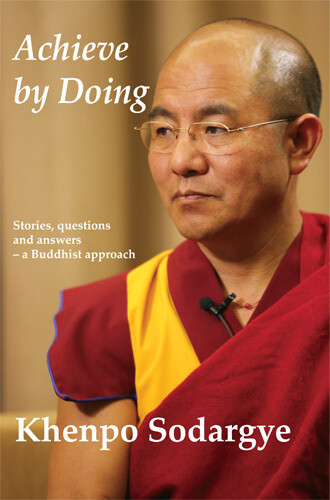Achieving by Doing
Many people complain that life is too difficult, and they seek solutions in the Buddha’s teachings. In reality, even if you receive the best instructions, they are ineffective unless you apply them. It is like a doctor treating your disease. If you receive the medicine but do not take it as prescribed, you will not be cured, even if the medicine is powerful enough to raise the dead.
Poet Lu You of the Southern Song Dynasty says, “What one learns from paper remains shallow; what one practices makes it profound.” Ideas from books will remain superficial. Only through hands-on application will its usefulness (or the lack of it) become clear to you.
Therefore, I wrote this book that contains many practical instructions, and have titled it Achieve by Doing. Try to work on these methods authentically; test them out yourself. Do it! Only then, through the subtle blessing of the Dharma,* will you experience some benefit, physically as well as mentally.
Be aware, however, that we eat bite by bite. No muscle is grown from just one mouthful of food. We walk step by step; no thousand-mile journey is covered in a single stride. Similarly, we train our minds bit by bit. No stage of sainthood is reached with only a few days’ practice. As long as you have progressed a little further today than yesterday, you should rejoice. Remember: water dripping day by day wears the hardest rock away.
Certainly, some people may not readily accept the parts of this book that seem to go beyond what they know. In this case, try not to reject those notions outright just because they contradict your education, thinking, “It seems like nonsense to me.” or “I don’t think it is possible…”
It is important to know that our conceptual mind is unreliable. The Buddha said, “Do not trust your ordinary mind; what you think is not reliable.” When we make any decision, especially in a field that we are not familiar with, we must employ rational wisdom rather than draw hasty conclusions solely based on “I feel that…” After all, how many times have we been tricked by our meandering thoughts?
In the West today, more and more scholars are accepting and identifying with the Buddha’s teachings. When they apply the principles of these teachings to clinical therapy, hospice care and other disciplines, remarkable outcomes have been achieved. Thus, those who were previously prejudiced against Buddhism are now compelled to reinvestigate its profound doctrines. Is Buddhism a superstition or a rational faith? Time will tell in the end.
Faith in Buddhism is not something that can be imposed on you, but in this world, neither you nor I can sidestep the abyss of birth, aging, sickness, and death. Fortunately, the Dharma provides excellent guidance aimed at dealing with such issues. If you have not been successful with other approaches, why not try the way of the Buddhadharma?
